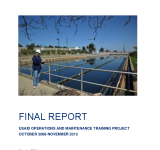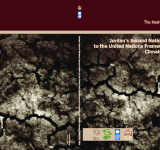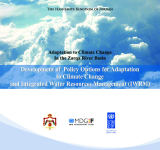The final report is a product of the USAID/ Jordan's 55-month Operations and Maintenance Training (OMT) Program that enhances workers and organizational performance in water infrastructure. The report includes the OMT Program's executive summary;; key accomplishments and lessons learned and recommended actions;; and it also identifies some the contexts;; challenges;; methodology and results and impacts of improving the operator standards and performance. According to the report;; the OMT exceeded its expectations and achieved all results in regards to the number of certified operators;; managers;; trainers;; developers;; and coaches graduated;; certified programs;; courses and tests developed;; training sessions conducted;; and legal measures and institutional actions enacted. The report identifies hat the dedicated and hands-on support of OMT's primary partners was a key factor in achieving the OMT target results. The program also expects the structure of the Jordan program will be responsive to changing needs and the progressive development of training capacity within the Jordanian water sector. Following the OMT's completion;; the players in the Jordanian program will continue to build their capacities and move to the next state in their institutional arrangement.


